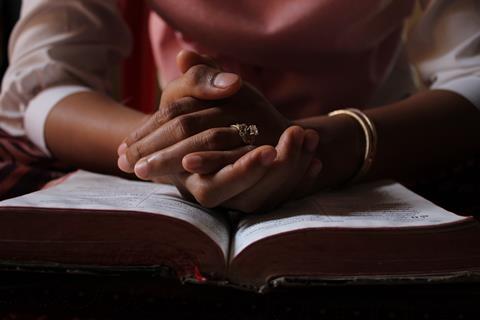More than half of adults believe freedom of religion is under threat in the UK, according to the Bloom report. Valuing faith means accepting that holiness and adherence to scripture are not optional for Christians - even when it doesn’t fit with popular opinion

“Faith is a force for good which government cannot afford to ignore.” So says the Bloom report, an independent review of the government’s engagement with faith, published this week.
Yet as I’ve stood with countless Christians in court hearings, and met many others day in and day out at Christian Concern, I’ve consistently seen genuine faith in Christ, and the beliefs that spring from that, marginalised at best, punished at worst.
Case in point is this week’s judgment in the case of Izzy Montague, who was challenging her son’s former school over a forced Pride parade for 4-year-olds and other teaching on LGBT issues. As the judge dismissed the case, he had so inversed logic and the evidence presented to him that he claimed Izzy, as a Christian, really agreed with the sentiment of posters littered around the school with the message: “I am gay, get over it!”
There is a lack of understanding that to be a faithful Christian, we are called to pursue and promote holiness
The rich teaching of Christianity on sexuality can hardly be reduced to a slogan, but these posters aggressively confront Izzy’s Christian beliefs, they don’t express them. This judge-splaining (to coin a phrase) on matters of faith is a sad indication of our society’s understanding of true Christianity.
Not an optional extra
The call for evidence in the Bloom report found that "53 per cent of respondents believe that freedom of religion or belief is under threat. This was notably higher among Christians (68 per cent), with many citing high-profile cases of job losses because of ‘bringing their faith to work’ or being penalised for bringing their faith into the public square. Many Christian respondents said they no longer feel able to be who they are in public or at work, after experiencing the dismissal of traditional religious beliefs and practices.”
From decades of experience supporting these Christians, most of these experiences are caused by the conflict between Christian beliefs and society’s promotion and approval of a radical sexual agenda. A sinister theme has appeared in many recent cases, where historic beliefs calling for repentance from sin and a call to purity are treated as optional for Christians. There is a lack of understanding that, to be faithful Christian, we are called to pursue and promote holiness.
The implication is that any Christian who lives and speaks out such holiness within a public context is the wrong sort of Christian – these Christians are choosing to be bigoted, homophobic and transphobic. In reality, they are the Christians who love God so much they have no choice at all and must, instead, find the courage to speak the truth.
Muddled or unbiblical pronouncements by the Church of England make this even worse, as government and the courts look to them to define Christianity for them. But the blame isn’t just with the CofE. Where are the rest of us? The Church in the UK has failed to make a clear gospel proclamation and we know that a nation perishes for lack of knowledge (Hosea 4:6).
Distinct from the world
The Bloom report does not mention that the hierarchy of rights, with state promotion and approval of LGBT at the top, is the source of many of these problems. Its recommendation that the government “should be equally vigilant regarding the protections and freedoms of religion, belief and faith at home as it is overseas” is welcome; but little progress will be made by ducking these vital issues.
Christians are losing their jobs, being reported to the police and counter extremism agencies, losing their practising certificates, and put on safeguarding registers as a risk to children. The courts are coming after them for extreme figures in costs.
Christianity cannot be assessed purely in terms of its usefulness to the economy
In public life, ‘Christianity’ is being stripped of anything that is distinctive from the culture we live in. Beliefs about sin, the preciousness of all human life, humans made unchangeably male and female, and the uniqueness of Christ are treated as optional extras that some Christians choose to adopt but which are disconnected from the essentials of the Christian faith.
We end up with a version of faith that is hollowed out and generic; one which can easily fit alongside other religions or even social clubs. This version of Christianity, with all its distinctiveness and responsibilities erased, is made in the image and with permission of the state. You can run foodbanks, host parent and toddler groups, organise events to counter loneliness. But don’t offer radical life transformation, prayer, purity or the Bible. Don’t offer Jesus.
A new relationship
The report’s introduction says that religion, faith and belief inspire Christians “to engage in both the civil and civic activities which build social capital and strengthen the ties that bind our country together”. In other words: the government likes Christians when we’re useful to them.
This is seen most in the report when it treats the engagement between government and faith during Covid as a great success. It highlights how wonderfully faith leaders encouraged ‘compliance’ to Covid rules, turned their buildings into vaccination centres and moved everything online.
The Church has failed to make a clear gospel proclamation, and we know that a nation perishes for lack of knowledge
Nothing is mentioned of the many church leaders who saw that the government overstepped its remit in outlawing Christian worship and was unresponsive to their concerns. We challenged the government’s closure of our churches and were successful. This was government overreach.
Vibrant, living Christian faith has plenty to say and do that an increasingly secular, modernist, pluralist society will rail at, but in which lies the great hope for our society. The centre of our faith is Jesus Christ himself. He had compassion for the poor, the sick and the outcast - and we must never lose that.
But he also confronted each one of us with our need to repent of sin and to follow only him. We need a reformation of morality in our land. A public understanding of what it really means to be made in God’s image, saved by his son and living by the power and the fruits of the Holy Spirit. This will bring about the healing our nation needs. And it all starts with his people (see 2 Chronicles 7:14).
The government - and culture at large - need to revise their relationship to Christianity, the one true religion, and in particular to the person of Jesus Christ. Christianity cannot be assessed purely in terms of its usefulness to the economy or NHS. It is the whole-life worship of the creator God and his son by the power of the Holy Spirit. Jesus is King of Kings and Lord of Lords.






































No comments yet